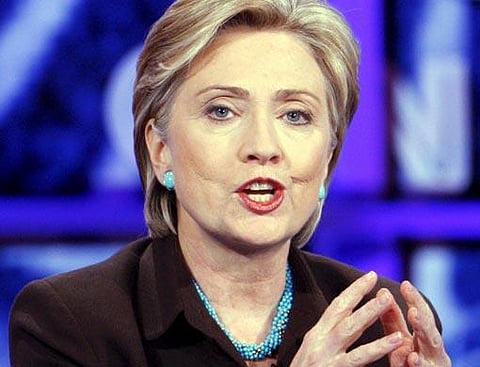Iran can't count on China
Tehran should improve relations with Arab states, rather than look further afield

Judging by official statements, US Secretary of State Hillary Clinton seems to have secured Chinese support for a fourth round of UN sanctions against Iran. In two days of talks in Beijing, Iran was near the top of the agenda in her high-level meetings with Chinese officials — second only to the highly sensitive topic of bilateral trade and economic relations. With Russia initially agreeing to the proposed new sanctions, the draft could be discussed in the UN Security Council this month.
The Americans and Europeans have dismissed the last-ditch agreement for Iran to send uranium to Turkey, brokered by Brazil and Turkey last month. This is despite the fact that it is very similar to the offer presented to Iran through the International Atomic Energy Agency (IAEA) by the US, France and Russia. The French have said the new deal is a ploy. They prefer the terms of the IAEA offer, which proposed sending 1.2 tonnes of low-enriched uranium (LEU) to Russia to be enriched to a higher degree, and then to France, before sending isotopes back to Iran. The Iranians objected to the French idea, as it would have ensured the West could monitor how enriched uranium was being used in Iran. The new agreement is different, as Iran's LEU will be kept by Ankara until the Iranians get the corresponding isotopes, and Tehran can reclaim its LEU at any time.
Western powers say that Teh-ran has doubled the quantity of its LEU since the IAEA's offer in October, so the agreement with Turkey is insufficient. It seems Clinton presented a strong argument to the Chinese that Tehran is bluffing. It probably went like this: If the Iranians are sincere that their nuclear programme is mainly for peaceful purposes, why are they concerned about the possibility of the French enriching the isotopes for them abroad? And if they are not keen on enriching uranium for purposes other than power production and cancer treatment, why do they keep more than a tonne of LEU?
Dim prospects
The Turkey-Brazil agreement was presented to the IAEA and a decision is awaited, which it seems will not be positive as the western powers are suspicious. The Chinese will not object to sanctions if the IAEA says Iran is not meeting its requirements. But Beijing might try to reduce the severity of the sanctions, as it has done before. That's why China was talking in detail to the Americans about the annexes to the draft sanctions decision. The new round targets banks and certain individuals in Iran, in addition to monitoring and inspecting shipments to the Islamic Republic. China would like to ensure its trade with Iran and economic interests are not much affected by these measures.
Iran can't count on China to avoid sanctions. Even if the Chinese — or the Russians for that matter — bargained with the Americans about the scope of the sanctions, it would not be for the sake of protecting Iran. These countries are mainly concerned about their business dealings, and the West understands this. It is clear that Chinese positions have little to do with ideological principles or political correctness.
Though China has interests in Iran, notably in the energy sector, they can't be compared to its interests elsewhere. Half of China's international trade is conducted with the US, Europe and Japan. Out of its almost $2.5 trillion (Dh9.2 trillion) external trade, the share of trade with the US amounts to nearly $400 billion (Dh1.5 trillion). Regionally, China's trade with the Gulf Arab countries is more important than its interests in Iran.
China has some room to manoeuvre with the West, but in the end its position might not be much different from that of Japan when it comes to what the US and western powers want in the region. The only viable alternative for Tehran is to mend its relations with the Gulf Arab states, though one might question whether it's already too late for this.
Iran should have sought to resolve issues such as its occupation of three of the UAE's islands, gas and water cooperation with Kuwait, and troubled ties with Bahrain. That would have been more helpful than seeking the help of Turkey or Brazil, and definitely better than playing games with Russia and China. But it seems Iran, thinking itself a major power, believed it knew better.
Dr Ahmad Mustafa is a London-based Arab writer.


